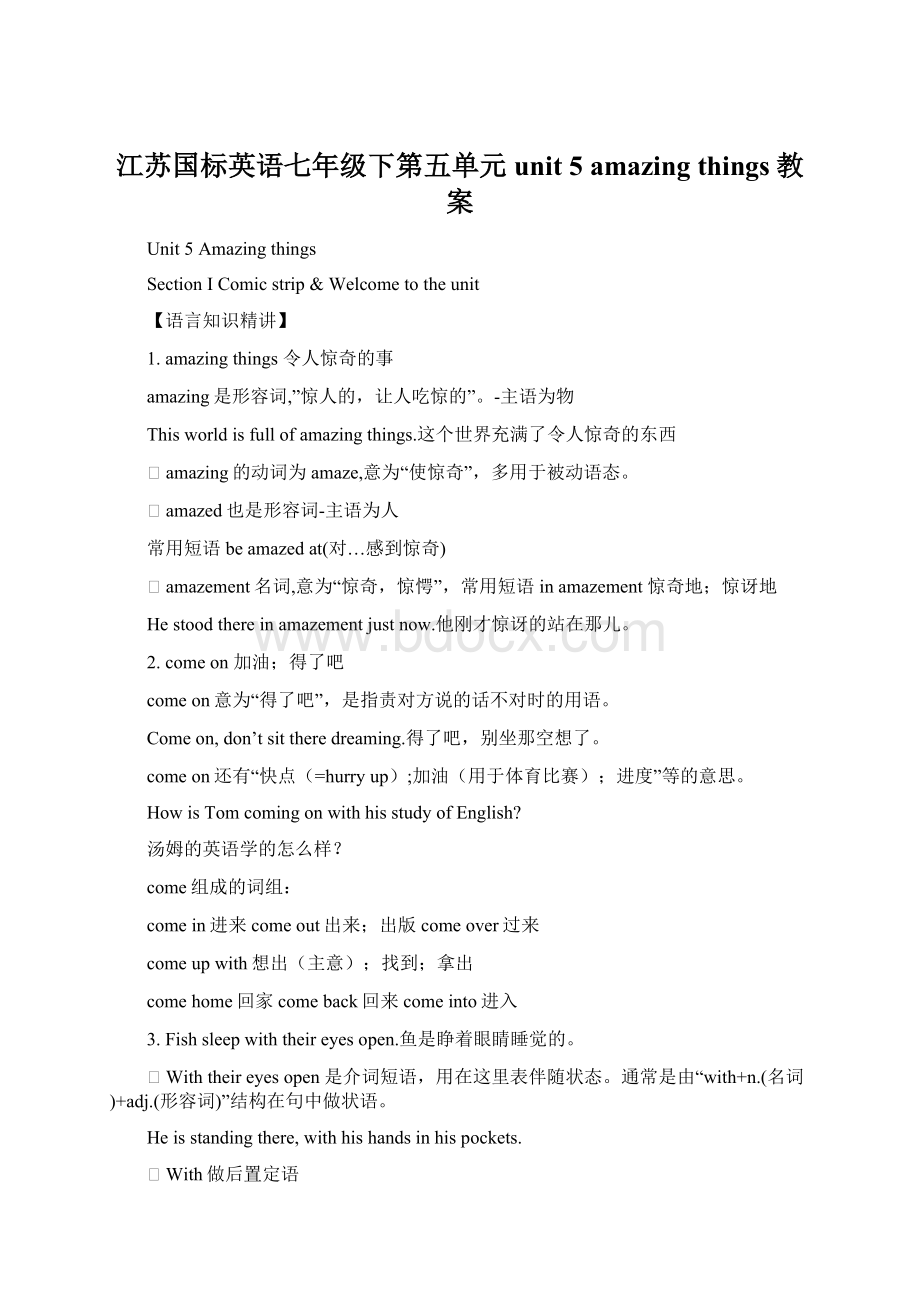江苏国标英语七年级下第五单元unit 5 amazing things教案.docx
《江苏国标英语七年级下第五单元unit 5 amazing things教案.docx》由会员分享,可在线阅读,更多相关《江苏国标英语七年级下第五单元unit 5 amazing things教案.docx(10页珍藏版)》请在冰豆网上搜索。

江苏国标英语七年级下第五单元unit5amazingthings教案
Unit5Amazingthings
SectionⅠComicstrip&Welcometotheunit
【语言知识精讲】
1.amazingthings令人惊奇的事
amazing是形容词,”惊人的,让人吃惊的”。
-主语为物
Thisworldisfullofamazingthings.这个世界充满了令人惊奇的东西
Øamazing的动词为amaze,意为“使惊奇”,多用于被动语态。
Øamazed也是形容词-主语为人
常用短语beamazedat(对…感到惊奇)
Øamazement名词,意为“惊奇,惊愕”,常用短语inamazement惊奇地;惊讶地
Hestoodthereinamazementjustnow.他刚才惊讶的站在那儿。
2.comeon加油;得了吧
comeon意为“得了吧”,是指责对方说的话不对时的用语。
Comeon,don’tsittheredreaming.得了吧,别坐那空想了。
comeon还有“快点(=hurryup);加油(用于体育比赛);进度”等的意思。
HowisTomcomingonwithhisstudyofEnglish?
汤姆的英语学的怎么样?
come组成的词组:
comein进来comeout出来;出版comeover过来
comeupwith想出(主意);找到;拿出
comehome回家comeback回来comeinto进入
3.Fishsleepwiththeireyesopen.鱼是睁着眼睛睡觉的。
ØWiththeireyesopen是介词短语,用在这里表伴随状态。
通常是由“with+n.(名词)+adj.(形容词)”结构在句中做状语。
Heisstandingthere,withhishandsinhispockets.
ØWith做后置定语
Theroomwiththewindowsopenismine.
4.…butournoseandearsneverstopgrowing…可我们的鼻子和耳朵从未停止过生长。
Ønever否定词,从不。
Iamneverlateforschool.我上学从不迟到。
Østopgrowing停止生长。
It’stoohot.Pleasestopworking.
stop+doing停止做某事stop+todo停下来去做另一件事
5.funnyadj.有趣的;滑稽可笑的
Ourteachertoldusafunnystorytoday.
今天我们老师给我们讲了一个有趣的故事。
Theplayisveryfunny.(=Theplayisgreatfun.)
那出戏非常有趣。
funn.
Ø活动;快乐;风趣
Thechildrenhadalotoffunattheseaside.
孩子们在海边玩的很开心。
He’sfulloffun.他很风趣。
Ø有趣的人或物
Yourbrotherisgreatfun.你哥哥很有趣。
6.Thesunisabout1,300,000timeslargerthantheEarth.
太阳大约比地球大1,300,000倍。
这是一个比较的句式。
句式结构为:
主语+be+形容词比较级+than+比较对象
HeistallerthanJim.他比吉姆高。
KittyisthreesecondsquickerthanI.基蒂比我快三秒。
例题
1.
AreyouatthefootballmatchbetweenChinaandKorea?
(amaze)
2.
Thefamouswriterintroducedushisnewbookthatwill
nextmonth.
A.giveoutB.comeoutC.putoutD.comeout
3.
Thedeskalotofbooksonitismyteacher’s.
A.forB.withC.withoutD.put
4.
Hurryup!
Don’tstoptrees.
A.plantB.plantingC.toplantD.plants
5.–WhatdoyouthinkoftheTVplayTravelWest?
–It’svery(interest).Manychildrenlikewatchingit.
6.-Doyouknowwhois,(tall)MaryorKitty?
-ofcourseKittyis.
【语法要点总结】
1.同根形容词
2.cool的不同含义
Øcool作形容词,意为“酷的,棒极了;凉爽的;冷静的”
Jayisverycool,andallofusliketolistentohissongs.
周杰伦酷极了,我们大家都喜欢听他的歌。
It’scoolinAutumn.秋天凉爽。
Keepcool,oryouwillmakemistakes.保持冷静,否则会出错。
Øcool作名词,意为“凉爽的东西,平静”
Theteaistoohot.Ilikecool.
Ø作动词。
意为“冷静下来”
WhenIcooldown,Iwillthinkaboutitcarefully.
3.动词不定式作定语
动词不定式放在名词或代词之后作定语。
Ihavemuchhomeworktodoeveryday.我每天有很多作业要做。
例题
1.翻译:
天气凉爽,那位很酷的男孩正在踢足球。
有人犯规的时候,他会保持冷静。
2.
Pleasegivemesomething.
A.drinkB.todrinkC.drinking
SectionⅡReading
【语言知识精讲】
1.Asusual,theysatdownunderabigtree.像往常一样,他们坐在一棵大树下。
asusual意为“像往常一样”“照例”,在句中作状语。
Hecamebacklatefromworkasusual.他跟平时一样很晚下班回来。
Øusual意为”平常的,往常的”,是形容词。
Øunusual意为“不寻常”,是usual的反义词。
Øusually意为“平常,往常”,是usual的副词。
Weusuallyhavebreakfastathome,beforewegotoschool.
上学之前,我们通常在家里吃早饭。
注意:
有些形容词+ly后变成了副词。
carefulcarefullybeautifulbeautifullyusualusually
2.Theyturnedaroundbutsawnothing.她们转过身去,可什么也没看到。
Øturnaround转身
Jimturnedaroundandsawhisparentsstandingbehindhim.
吉姆转过身去,发现他的父母不在他的身后。
Ønothing表否定意义的不定代词,意为“没什么”
Nothingisdifficultforyou,ifyoutryyourbest.(作主语)
Ihavenothing,soIdon’twanttogowithyou.我一无所有,因此我不想与你一起去。
(作宾语)
Hecanfindnothingwronginyourcomposition.
他在你的作文中找不出任何错误。
(形容词wrong修饰不定代词nothing时置于其后)
3.frightened与afraid的区别
Øfrightened可用作表语,也可用作定语。
用作定语时,意为“受惊的”。
Millieisfrightenedofsnakes.米莉怕蛇。
Øafraid通常只做表语,不做定语。
固定搭配:
beafraidof
Don’tbeafraidofdogs.不要怕狗。
4.Whathappened?
发生什么事了?
Øhappenvi发生
Whathappenedtoher?
她发生了什么事?
happentodosth.碰巧做某事
Ihappentomeetmyoldfriendsinthestreet.我碰巧在街上遇见我的老朋友。
Ithappenthat+从句碰巧…
Ithappenedthathewentoutwhenweranghim.我们给他打电话时,碰巧他不在家。
Ø辨析:
happen与takeplace
前者是碰巧发生,带有偶然性;后者指经过安排的发生。
Ihappenedtobethere.我碰巧在那儿。
Whenwilltheweddingtakeplace?
婚礼什么时候举行?
注意:
happen与takeplace都不能用于被动语态。
5.Hesearchedthebushes.他搜索了灌木丛。
search,find和lookfor的区别
✓search强调动作的过程,侧重指“(仔细)搜查,搜寻,搜索”
Thepolicesearchedeveryroominthebuilding.
警察搜查了楼里的每个房间。
✓find强调动作的结果,侧重指“找到,发现”
Simonsearchedcarefullybuthefoundnothinginthebushes.
西蒙在灌木丛中找的很仔细,但什么也没发现。
✓lookfor强调动作的过程,侧重指“找,寻找”
MillieislookingforSimon.米莉正在找西蒙。
例题
1.
Listen!
Canyouhearanything?
It’sstrange.
2.
Weoftendosomegamesinclass,soitisforustodospellnewwordsgameonebyone.
3.翻译:
当他转过身去时,见一只小狗正在啃骨头。
4.
-Couldyoupleasetellmeintoday’snewspaper?
-Sorry,.
A.somethingspecial,nothingspecial
B.specialsomething,specialnothing
5.Thepolicetheprisonertoseeifhehadagun.
A.searchedB.searchedforC.searchD.looked
6.Doyouknowoverthere?
A.whathappensB.whatwashappened
C.whatishappeningD.whatdidhappen
【语法要点总结】
1.倒装句综合
“Hereitis,”Andysaidtohimself.“它在这里,”安迪自言自语道。
Hereitis.是一个倒装句,正常的语序应为Itishere.
倒装句特点:
Ø表示地点方位的副词、介词短语放在句首;
Ø用一般现在时代替进行时;
Ø主语是名词时,采用全部倒装;主语是人称代词时,采用部分倒装(即主谓不颠倒);
Ø谓语动词一般为不及物动词。
Herecomesthebus.(=Thebusiscominghere.)公共汽车来了。
Theregoesthebell.(=Thebellisringing.)铃响了。
Onthegroundlayawallet.(=Awalletlayontheground.)地上有个钱包。
2.表示“喜好”动词综合
Øbecrazyabout意为“热衷于,痴迷于”
Ølove意为“喜爱,热爱”
Øenjoy+doing意为“享受”
Øbefondof+名词,代词,doing意为“喜欢”,侧重指“习惯爱好”
Ølike喜欢
Ødislike与like相对
Øhate憎恨,与love相对
SectionⅢGrammar
【语言知识精讲】
1.ago与before
Øago用于一般过去时,其前往往是一段时间。
Isawthemtwodaysago.
Øbefore可用于多种时态
Makeaphonecalltomebefore7:
00.
Øago不可单独使用,须与一段时间连用,但before可以单独使用作状语。
Ireadthestoryinanotherbookbefore.我以前在另外一本书中看到过这个故事。
Italkedtomyparentsaboutittwodaysago.
我两天前跟我父母谈过此事。
2.spend,cost,take,pay的辨析
Øspend与pay
spend+时间/金钱onsth
Hespentmuchmoneyonclothes.他在穿衣上花了很多钱。
spend+时间/金钱(in)doingsth
Ispentmuchtimereading.
payfor
Letmepayforit.让我们来付吧。
Øcost与take
cost的主语是sth
Ittakes…todo…
Thepencostmetenyuan.这支钢笔花了我10元钱。
Ittookme2hourstofinishdoingmyhomeworkyesterday.昨天夜里我花了两个小时完成作业。
【语法要点总结】-动词的过去式
练习
study-go-tell-spend-
travel-stop-search-invite-
cost-cry-put-push-
join-teach-buy-fly-
chat-pay-draw-think-
SectionⅣIntegratedskills,Studyskills,Task&Self-assessment
【语言知识精讲】
1.few,little,afew,alittle的用法区别
few+可数名词,(a)little+不可数名词;afew/alittle为肯定含义,few/little为否定含义,意为“没多少”
注意:
onlyafew(=few)notafew(=many)quiteafew(=many)
2.without的用法
Ø(表否定)没有,无,不需。
Theletterwaspostedwithoutastamp.那封信没贴邮票就寄出去了。
Wegottherewithoutanytrouble.我们到达那儿,一路上没遇到麻烦。
Ø用在no,not,never等否定副词之后(强调肯定)没有…不,没有…则不能…
Youcan’tgetrichwithouttakingrisks.人不冒险不富。
Ø(与-ing形式连用)不,无,没。
Sheenteredtheroomwithoutknocking.她没敲门就进了房间。
Ø(表条件)若无,若非。
Withoutwater,wecan’tlive.没有水,我们就不能生存。
3.nolonger,notanylonger,nomore,notanymore的用法区别
nolonger=notanylonger;nomore=notanymore
Heisnolonger/nomoreachild.=Heisnotachildanylonger/more.
他不再是一个小孩。
4.atthesametime同时
5.atleast的用法
atleastadv.至少,无论如何,反正
Shewasatleastthatmuchshorterthanme.她至少比我矮那么多。
6.as…as…的基本用法
Heisasstrongasahorse.他跟马一样壮。
Øassoonas意为“一…就…”,引导一个时间状语从句
I’llcallyouassoonasIfinishmyhomework.我一完成作业就给你打电话。
Øaslongas意思是“长达…之久;只要…“
Itookusaslongasthreeyearstocarryouttheplan.
Øasmuchas意思是“高达…,与…一样多“
Ø倍数+as+adj+as意思是“…是…倍“
Yourroomistwiceaslargeasmine.你的房间比我的房间大一倍。
Øas…aspossible意思是“尽可能…“
Pleasereplymeassoonaspossible.请尽快回复。
Øas…asusual/before意思是“和平常/以前一样…“
Shelooksasprettyasbefore.
Øaswellas意思是“也;像…一样“
Shecooksaswellashermotherdoes.她做饭像她母亲一样好。
【语法要点总结】
如何写英文书信
1.信头:
地址从小到大,日期写地址下面日月年或月日年
2.称呼:
Dear…
3.正文:
每段开头空3-5字母
4.结束语:
Yourssincerely
5.英文信封的写法:
一般把收信的地址写在信封的中央或偏右下